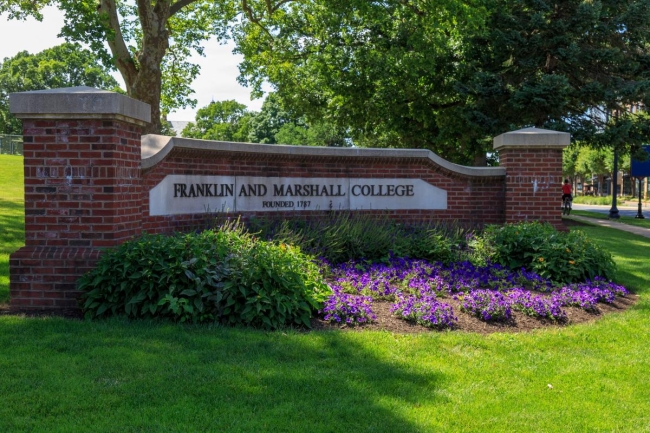You have /5 articles left.
Sign up for a free account or log in.

ISTOCK.COM/gsheldon
Faculty at Franklin & Marshall College, a liberal arts college in Pennsylvania, have raised academic freedom concerns about a planned F&M semester program in Shanghai designed to teach first-year Chinese students who may not be able to make it to campus due to the pandemic. Students in the Shanghai program will take online classes with professors at F&M, a college with an especially international student body: between 20 and 25 percent of its students are from overseas, with most coming from China.
A group of 16 faculty members sent a letter to F&M administration earlier this month expressing concerns, and the campus chapter of the American Association of University Professors met with the provost last week about this issue.
F&M’s provost, Cameron Wesson, said via email that “a small number of faculty” had raised questions “regarding assurances of academic freedom for students participating in the program, but I met with our AAUP chapter's executive committee and I believe those concerns have been addressed to everyone's satisfaction.”
Wesson declined an interview request to discuss these issues further, but faculty report that the provost has started the process of forming a faculty committee to oversee the Shanghai program, one of the AAUP's recommendations.
Concerns about academic freedom for American university programs in China are not new and have only deepened in recent years as pressures on Chinese students and faculty members have, by expert accounts, increased. A September 2019 report from Scholars at Risk, an organization that monitors academic freedom conditions worldwide, said that in mainland China, "state and university authorities have employed a range of tactics to intimidate, silence, and punish academics and students," including "limits on internet access, libraries, and publication imports that impair research and learning; orders to ban discussion and research on topics the Party-state deems controversial; surveillance and monitoring of academic activity that result in loss of position and self-censorship; travel restrictions that disrupt the flow of ideas across borders; and the use of detentions, prosecutions, and other coercive tactics to retaliate against and constrain critical inquiry and expression."
The Scholars at Risk report noted that "a growing number of foreign higher education institutions have pulled out of joint ventures or otherwise scaled back their institutional presence in China" in light of academic freedom concerns. The report cited decisions to cancel planned or existing programs by the University of Groningen, in the Netherlands, and Cornell University's School of Industrial and Labor Relations. Wesleyan University announced in October that it was ending talks over a possible China campus in part over academic freedom concerns.
The letter from the 16 F&M faculty members emphasizes that professors do not oppose the Shanghai program, but it says that the program “must not violate academic freedom which is the bedrock of the liberal arts college.”
“While we seek ways to welcome our Chinese students for the 2020-21 academic year we must be alert to how academic freedom violations -- however short-term they may be -- risks affecting all Chinese students, both on the mainland and in Hong Kong, who suffer persecution and the denial of academic freedom,” the letter states. “‘F&M at Shanghai’ must not include the teaching of our core curriculum and elective courses that will negate this freedom, lest it buttress Chinese government policies.”
Dennis Deslippe, a professor of American studies and women’s, gender and sexuality studies at F&M who helped organize the letter, said he is concerned about the faculty's role in course selection for the Shanghai program. In his view, F&M should not teach classes in its core curriculum program, known as Connections, which, per the description on F&M's website, encourages students to “understand the limits of knowledge and the value of evidence, to respectfully debate with others, to refine in themselves a sense of judgment, and to analyze critically, speak persuasively and listen attentively,” among other skills.
“We understand that certain courses wouldn’t draw the attention of Chinese officials or at least the ire of Chinese officials,” said Deslippe, who cited math, music and science courses as examples of courses that would be uncontroversial. But he questioned how a “bona fide” Connections course could be delivered in an environment where it would be subject to Chinese government censorship and possible surveillance.
“How could a Connections course that would honor the purpose of Connections also serve our students in Shanghai?” he asked. Deslippe said the formation of a faculty oversight committee is a positive step, but he added that since the program was already created, "it may have little influence in challenging it."
The AAUP executive board also emphasized in a statement that its members do not oppose the program per se. “We understand the importance of this program to our college and we don’t believe it’s an either-or proposition -- a program with compromised academic freedom or no program to ensure academic freedom. It’s too simple to think of it this way,” the board said.
The board said the provost was receptive to both its requests that it appoint a faculty oversight committee and that it be provided "more information about how the administrators of the program are negotiating academic freedom at this point."
The AAUP leadership said that while it does not agree with the provost’s comments that all its concerns have been addressed satisfactorily "as of yet, we are hopeful that the recommendations we mentioned will, when implemented, prove satisfactory."




